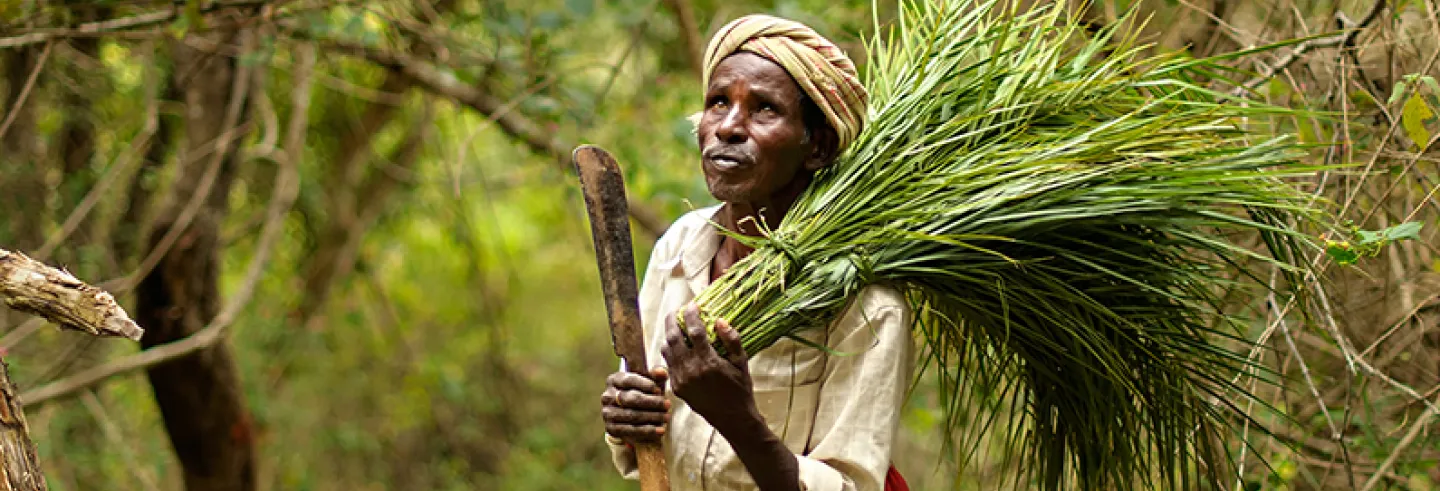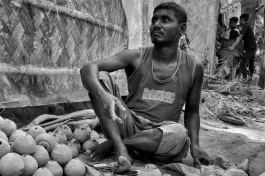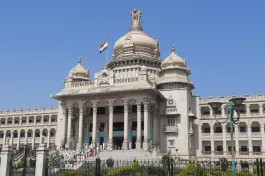It was just another day in the midst of the second wave of Covid-19 in Chamarajanagar district of Karnataka in early June. The district was still reeling from the overwhelming number of people ill with Covid-19 thronging hospitals. At one of the podu (hamlet) of the Solega — an Adivasi people in southern Karnataka and northern Tamil Nadu — Ketha (name changed) had just discovered that he had tested positive for Covid-19. When his 30-odd year old relative at a neighboring podu further uphill into the forests of Biligirirangan Hills died at home, the local health officials insisted on testing the deceased post-mortem (as is the protocol here for home deaths) and found he had been Covid-19 positive.
Ketha and others were just coming to terms with this “faraway city illness.” "This is not our disease; this is yours and people like you bring it to us," he would later say to officials and health workers in anger and disbelief.
While Ketha lived at a remote and sparsely populated corner of a large tiger reserve in the district, his unlucky relative who died was in fact further inside the forest. As the pandemic began to engulf communities all over India, the plight of marginalised communities such as the Adivasis living in remote rural areas whose access to and acceptability of healthcare has been precarious has received limited attention. Community health practitioners with experience of working among Adivasis and Adivasi leaders have spoken about the need for extensive community engagement to mitigate a sense of despair and isolation. Could their remoteness provide some level of protection or would the virus transcend distance and terrain to reach every community including those living in hard-to-reach areas? In Ketha'’s case it was not an academic exercise but a hard reality.
While we respected the Solega elders who told us that they were protected by their traditional medicines ... we also had the responsibility of engaging respectfully with them and taking them into confidence about testing, containment and, eventually, vaccination.
Like some other Adivasi communities, the Solega's interface with the outside society (naadavaru as many of them like to say; in Kannada this translates to ‘city people’) has been minimal. They have leveraged civil society and NGO presence by empowering themselves and only recently have their rights over their own lands been recognised through the Forest Rights Act. They rely strongly on traditional medicine and oral/folk traditions for healthcare.

Since the second wave hit the district, two of the authors, doctors trained in public health and working in non-governmental organisations, have been assisting the chief executive officer (CEO) of the zilla panchayat in planning a response. While the initial period of the public health technical assistance focused on hospital-based measures such as speedy setting up of triage in district and sub-district hospitals and deployment of urgent relief materials and oxygen concentrators, eventually the surging numbers in rural areas pushed us towards greater community engagement. Karnataka's rural development and panchayat raj department has been heavily invested in strengthening the local government response through the formation of task forces at the gram panchayat levels. Visits to and supportive supervision for the panchayat development officers (PDOs), who are the key officials in the village were an important part of the response. This has been a key strategy employed by the CEO of the zilla panchayat.
When Ketha's relative died of Covid-19, it was clear to many of us who were working with the Solega that the pandemic had indeed arrived in their community. While we respected the Solega elders who told us that they were protected by their traditional medicines and their relative isolation from city-folks, we also had the responsibility of engaging respectfully with them and taking them into confidence about testing, containment and, eventually, vaccination. But we faced a huge challenge. How do we gain the confidence of a community that has had a historical mistrust of public services, given the adverse relationships with various government departments against whom they have had to mount struggles to secure their rights?
Even as our reflections continued at their own pace, Ketha's predicament was to give us a potential solution. On a visit to the PG Palya panchayat, when the PDO informed us that a young adult Solega and a few members of his family who were among the primary contacts of the person who recently died had tested positive, we offered to accompany the PDO to the podu. We were keen to understand how Ketha and his family would see the immediate next steps. Wherever household circumstances do not allow for isolation, the rules require that the person goes to a government-established Covid Care Centre (CCC). Adivasis, like many other rural poor communities, do not have large enough homes with amenities that allow some of the family to physically isolate themselves from others. Indeed, this perverse social situation is one of the primary reasons why we need decentralised and socially adapted solutions. But with Ketha, there was an additional concern. The historical relationship between the Solega and the “authorities” was contested and also likely conditioned his response to many of us gathering at his podu.
The idea that experts and officials know what is best betrays a patriarchal complex of being saviours for these communities and is remnant of colonial approaches to health and development.
The PDO led us to Ketha’s doorstep. Already at the doorstep were well-intentioned local actors including the community health worker, the ASHA (Accredited Social Heath Activist). Many podus including Ketha's do not yet have an ASHA from the Solega community, but an ASHA from another community is often at hand, as was the case here. The pandemic had reached this remote corner of our district to the doorstep of an Adivasi house, and here was the entire district apparatus with apparently good intentions, to deploy their collective vocabulary to give him all the information he needed to be able to take the right decision: to get admitted at a CCC, about 20 km away. He refused. A teacher from an educational institution who had been commandeered into playing the role of a counsellor was at hand and tried in vain. The teacher just could not understand why this ignorance could not be treated with good quality information. (This is often the issue with professionals engaging unreflexively with some communities; they attribute any behaviour to lack of information or to illiteracy.)
It was no surprise to some of us who have closely worked with the leader of the Zilla Budakattu Girijana Abhivruddhi Sangha (District Indigenous People’s Welfare Society), a Solega people’s collective, that Ketha would have none of this. The more and more people tried to convince him about the need to protect his village and his neighbours as well as ensure his own protection, he would not have it. The temperature of the conversation picked up when a social worker, deputed by the district administration for Covid-19 related activities, threatened police action. Things suddenly took a turn for the worse. Neighbours cautioned that all of us “outsiders” would be forbidden from entering the podu and they would boycott any health worker or government worker if this were the case. The head of the Solega collective verbally clashed with the social worker, reminding him to be conscious of the "space" he was standing in; while the social worker stood his ground displaying his official authority. Even while the events were quickly unfolding, the public health doctors and leader of the Solega collective reminded the CEO of the zilla panchayat and others that the conversation was proceeding without more local leaders from the Solega, whose presence would also make Ketha comfortable enough to argue and enter a dialogue. The presence of a representative of the Solega people’s collective in the scene mitigated the dialogue a bit.

From the position of the leader of the Solega collective, it was clear that this impasse could not be resolved by coercion. On the other hand, we knew that Ketha and others’ continued presence in the podu was a risk to the larger community. The more we listened to him and the more the people from the podu spoke, we realised that that the best way was to pose the problem to the Solegas.
Eventually what Ketha offered as a compromise was in fact a better solution than what we had to offer. “Will come if it is in our podu,” he said. It dawned on many of us that the tribal residential school at his village was an ideal location for him and others to isolate themselves while feeling safe and near their own community. Ketha did not want to go to a faraway CCC where, it appeared, he felt unsafe and unwelcome.
Listening to this, the panchayat adhyaksha, the elected head, pointed out that there were 16 podus in the panchayat and a community-based facility where Solega patients felt safe was ideal. Indeed, others offered to provide home-cooked meals that no CCC could be able to match. The zilla panchayat CEO recalled his previous efforts at organising community-based decentralised facilities that had not yet been established in other areas. Rather quickly, a calm dawned on us as we had hit upon a solution. Given the presence of the CEO, PDO, and the head of the panchayat, resolutions were passed and permissions were given to provide administrative sanctity to the local decision. Eventually, the district administration also acceded to this demand, allowed the "exception" and constituted a committee comprising local actors, NGOs, and health workers to oversee care.
Cultural safety is not about culture... Cultural safety is about respecting the rights of the marginalised and promoting a reflective practice on how we experts are in a way part of the problem due to our privileges and assumptions.
To our pleasant surprise, the very next day 70 patients queued up for testing in an area where convincing anyone to test had otherwise been extremely difficult. Many of them said that they did not fear becoming positive any more since the care was at their own residential school. The assurance of care in one's 'own spaces' is important for anyone, but particularly for communities that have had a contested relationship with public services. As we write this, many others are changing their earlier opinion on vaccines. They appear to be much more open to the idea of vaccination at their own spaces rather than in distant primary health centres.
Our experience highlights a few issues that we feel need to be discussed in the context of providing services, including healthcare when it comes to marginalised communities such as the indigenous groups in different parts of India. The idea that experts and officials know what is best betrays a patriarchal complex of being saviours for these communities and is remnant of colonial approaches to health and development. Such approaches have been shown to be not only inefficient but actually counterproductive and harmful when it comes to improving health and wellbeing outcomes. This is especially so when Adivasi and many other social groups are entirely unrepresented in professional groups or in administration.

In this context, the public health doctors and researcher among us feel it is important to move from such approaches to one that is rooted in cultural safety. Cultural safety explicitly foregrounds power relationships that exist between marginalised communities and those who are in positions of power and are responsible for delivering services to them. It also takes a rights-based approach that ensures that the service providers for communities such as the Adivasis realise and reflect on the fact that their work stems from the rights enjoyed by marginalised communities.
A culturally safe approach moves beyond cultural competency frameworks that focus on service providers learning the language, customs, and traditions of the community that they work for. Cultural safety requires explicit acknowledgement and challenging of assumptions and biases that we as members of the dominant community hold about marginalised communities. It requires the members of dominant communities to acknowledge that they have been recipients of privileges that have played a role in ensuring that they are currently where they are. Privileges that have been denied to members of marginalised communities for a host of reasons.
Our experience also raises a few questions that we feel are relevant towards building a reflective theory and practice of public health among vulnerable communities. Why is it that well-intentioned health workers and other officials often take the punitive route, such as police action, to obtain compliance from communities? How many of us reflect on our own biases and prejudices vis-a-vis the communities with whom we work? How can we build cultural safety into our public health practice with various communities?
Cultural safety is not about culture if we define it using a narrow framework of specific traditions and customs. Cultural safety is about respecting the rights of the marginalised and promoting a reflective practice on how we experts are in a way part of the problem due to our privileges and assumptions. Such reflective practice about our assumptions and biases enables us to build true bridges with the communities that we work with and allows us to be part of crafting a solution that is rooted in a rights-based approach that is not patriarchal.
This is a critical reflection on the events that unfolded in early June. Two public health trained doctors, the CEO of the zilla panchayat, the leader of the Solega indigenous people’s collective, and a researcher were involved in the events described here. Parts of the reflection pertain to events where only some of these actors were involved.
We are grateful to Harshal Bhoyar, CEO of the zilla panchayat, for his constructive engagement and joining several 'local' actors in co-creating this decentralised solution.











